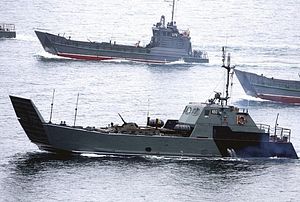China and Russia will hold a joint naval drill in the South China Sea this September, a spokesperson from China’s Defense Ministry announced on Thursday. Yang Yujun said the drill, dubbed Joint Sea 2016, will be conducted “on both land and sea,” according to Xinhua, and will “enhance the capabilities of the two navies to jointly deal with maritime security threats.”
The official confirmation comes after Chinese media reported that this year’s version of the joint annual naval exercise would take place in the South China Sea. As Franz-Stefan Gady noted for The Diplomat at the time, “given that the People’s Liberation Army Navy (PLAN) North and East Sea Fleets hosted previous Sino-Russian naval drills, it appears likely that this year’s iteration of the Joint-Sea exercise will be hosted by the Nanhai [South Sea] Fleet, the PLAN fleet responsible for the South China Sea.”
China and Russia have been ramping up their security partnership in recent years, with both sides pledging to increase the number of joint drills in 2016. The exercises in September will mark the seventh joint naval drills since 2005. The Joint Sea drills, in particular, have taken place each year beginning in 2012. China also conducts annual counterterrorism exercises, known as Peace Mission, with Russia.
Last year, Joint Sea 2015 consisted of two parts: an exercise in the Mediterranean in April and one in the Sea of Japan in August. As the U.S. Department of Defense noted in its 2016 report on China’s military activities, “Phase one in the Mediterranean focused on protecting sea lines of communications (SLOCs) and combating terrorism and phase two in the Sea of Japan featured simultaneous amphibious landings, joint air defense drills, and anti-surface ship drills.”
Details on the upcoming Joint Sea 2016 drills and their focus have not yet been released. Speaking about the drills in the Defense Ministry’s monthly press conference, Yang said that the drills would be “a routine exercise between the two military, aiming to consolidate and develop China-Russia comprehensive strategic partnership, deepen friendly and practical mil-to-mil cooperation, and enhance the capabilities of the two navies to jointly deal with maritime security threats.”
He added, “The exercise is not targeting any third party.” However, despite that assurance, conducting military drills in the South China Sea remains a politically sensitive topic, regardless of which countries are involved. China itself has denounced the United States for holding drills in the sea. In April, when the U.S. and the Philippines – one of China’s rival claimant to disputed features in the South China Sea — held joint drills in the area, Foreign Ministry spokesperson Lu Kang told reporters, “The actions taken by the US and the Philippines contaminate relations among regional countries, provoke conflicts in the region, aggravate tensions and jeopardize peace and stability in the South China Sea.”
China itself has used such drills as political signaling before. Notably, it held naval drills in the South China just before and after an arbitral tribunal awarded the Philippines a massive legal victory in its case challenging China’s South China Sea claims. The ruling was released on July 12; China held separate drills from July 5 to 11 and July 19 to 21. China’s air force also held a drill near the disputed Scarborough Shoal, and released an image of the H-6K bomber flying over the feature.
For Russia, the drills are a bit more awkward. Moscow has close defense ties to Hanoi, which is another of China’s rival claimants in the South China Sea. Despite deepening security ties with China, Russia has tried to stay neutral on the South China Sea question, even showing some signs of annoyance with China’s eagerness to get Russian support on the issue.
Russia is currently in the process of delivering two frigates and six submarines to Vietnam – which will undoubtedly be used in part to patrol Vietnam’s claimed territory in the South China Sea.
































